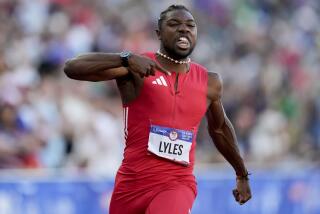Hit ‘Em Again, Harder! : That’s the Way the Highly Competitive British Sporting Press Plays the Game
LONDON — During the Wimbledon fortnight last summer, the competition, as usual, was as intense among the sports sections of London’s newspapers as it was on Centre Court.
The papers reacted to news from the famous stadium with headlines that were big, bold and juicy. Those headlines, however, and reporters’ questions as well, often had nothing to do with tennis.
John McEnroe was asked more often about his romance with Tatum O’Neal than about his tennis game. “Where’s Tatum?” the reporters demanded to know. “Is she coming? Are you engaged? Will you dedicate the Wimbledon trophy to her and then get married?”
While the Times carried excerpts from Chris Evert Lloyd’s book, “Lloyd on Lloyd,” the Daily Express countered with lurid accounts from “Martina,” the life story of Martina Navratilova.
“My Dilemma at 17; Whether to Have My Baby or My Career,” read one headline over a chapter in which Navratilova reported that she thought she was pregnant at 17.
The reporting of sports here, as is the case with the way the English drive, speak and run their government, is nothing like it is in the United States. The stories are brief, the type small and the headlines big, bold and often bizarre. The competition, especially among the tabloids, is straight from “The Front Page.” Hildy Johnson would love it.
English sportswriting is acerbic, personal and often irreverent. There are some irreverent writers on U.S. papers, too, but day in, day out, the Yanks are no match for the English.
It is not surprising that London sports sections are so competitive and irreverent. Each is just trying to keep up with the rest of its paper as it fights for its share of the circulation in probably the world’s most competitive newspaper market.
The four major tabloids have a total circulation of about 10 million. The Sun leads with 4 million, followed by the Mirror with 3.25 million and the Daily Express and Daily Mail each with just under 2 million. No daily paper in the United States comes close to those numbers.
The tabloids fight for subscribers every day with exclusive stories--many of which they buy--lurid tales of rape, murder and sex and photos of undressed women, who all seem to be models. Some stories getting prominent display recently included:
--”Twiggy Finds A Fella.”
--”Sailor’s Fury in Wren’s Bedroom.”
--”Sir Jeffrey Sails Toward New Love.”
--”Woman Beat Dog in Show Ring Uproar.”
--”Why the Queen of Pop (Diana Ross) Said No to Prince.”
--”Plucky Dog Ben Rescues Dawn, 11, from Car Sex Beast.”
Months-old rape cases get bigger headlines and more space when they come to trial than important world events. In the United States, such papers sell at Supermarket checkout stands.
The Daily Express recently headlined a rumor that Tatum O’Neal was expecting a baby next May. “Mum’s the Word from Tatum,” the paper said. Getting no comment from O’Neal or McEnroe, the paper reported, “Tatum’s gynecologist knows but he’s not saying.”
Besides the usual fare of soccer, horse racing, boxing, rugby and cricket, sports sections here carry news of bridge, darts and snooker, a pocket billiards game. Snooker, especially, gets big play, so when snooker star Alex (Hurricane) Higgins was arrested last month, the tabloids had their fun.
“Police Calm Storm at Hurricane Home,” the Daily Express reported in a large headline. “Snooker Star Higgins Arrested After Blazing Row with Wife.”
The Mirror countered with a bold headline of its own: “Hurricane: My Love Bust Up.”
The Daily Mail ran a revealing photo of an airline stewardess who, it reported, “has been secretly dating” another snooker star, Kirk Stevens. The accompanying story said: “Last week, she comforted him after his shock defeat.”
Headlines often tell it as it is. The problems facing soccer here were detailed in the Mirror under a headline, “Soccer Going Bust.” The Times ran an even bolder headline: “Soccer: Who Cares?”
When the well-known captain of a leading cricket team was fired recently, the Mirror gleefully reported: “Bye Bye Botham.”
When England’s Sebastian Coe won the 1,500-meter run at the Los Angeles Olympic Games in 1984, much was made of his behavior immediately after the race. He turned, trotted back near the press section and pointed at the British reporters.
Recalling the scene, Tony Cornell, deputy sports editor of the Mirror, said: “Coe was expressing delight; he had proved a point. After Moscow, we were tearing him to bits. We said, ‘Seb is finished.’ There definitely was nothing sympathetic about it.”
English readers will not buy a paper for a blow-by-blow account of an event, the Mirror’s Adrian Brown said. “They are more interested in personalities.”
Asked why the English writers are such an irreverent lot, Brown said: “It’s the competition. You don’t have any competition in Los Angeles and very little anywhere in your country. Among the tabs here, it is fierce.”
Cornell said: “That’s basically true. There is a certain irreverence. We tend to build our sports stars up--the boxer, Barry McGuigan, is the latest example--and as soon as we get our fill, we knock them down.”
While most U.S. sportswriters report on the action of a game, the English are constantly searching for a story outside the action. McEnroe has felt their sting as much as any athlete, perhaps because of his sometimes irrational and boorish behavior. At 18 he was ridiculed in headlines and stories here as “Superbrat.”
“He’s quite right to hate the British press,” Cornell said. “He never got the respect he deserved off his tennis skill. ‘John, what did you say to the umpire when you smashed your racket?’ was typical of our approach. We tend to knock our stars.”
When Steve Ovett, another English Olympic champion, was 18, a London reporter wrote something nasty about him, Cornell said, and as a result he wouldn’t talk to British writers--even after he had won the 800 meters at Moscow. He did sell a story to a London paper, however, reportedly for $20,000.
“The British press is very pompous as well, besides being destructive,” Cornell said. “So far, we haven’t started knocking Steve Cram (England’s newest running star). He’s still approachable.”
McEnroe hates to play at Wimbledon because of the rough treatment he gets from the press. “Wimbledon officials advised him not to bring Tatum,” Cornell said. “We wrote, in our wisdom, that he was pining for her. It may not have been so, but it was a good line.”
What if a paper gets an edge, as the Times and Daily Express did with the books by Navratilova and Lloyd?
“All you can do is try to spoil it,” Cornell said. “It’s the smart thing to do. Calling Navratilova gay in headlines somewhat endeared her to the crowd.”
The personal observations many writers here inject into their news stories is a simple case of ego, in Cornell’s view.
“Mirror Backs Bruno,” said one headline. “We have injected a substantial sum to sponsor his attempt to win the European title,” said the story. “Frank Bruno was staggered when I broke the news,” the story continued.
To compete, the tabloids often buy exclusive stories from athletes and coaches and byline them “Exclusive from. . . . “ Papers also plug their sportswriters frequently by inserting in a story, “Joe Smith in Canberra” or “An Exclusive from Ian Brown” in large type instead of giving routine bylines.
Fleet Street sportswriters generally travel often, going great distances to report on major events all over the world. Long before U.S. writers began going to Wimbledon and the British Open in large numbers early in this decade, British reporters were familiar faces at major U.S. golf, tennis, boxing and auto racing events.
They often flocked to an event just to report on one British athlete, such as the golfer, Tony Jacklin. U.S. newspapers still do not send reporters to most major sports events in another country.
There has been one noticeable change in British sportswriting recently. Outspoken columnists have virtually disappeared, Cornell said. “Today, it’s a sharp, hard-hitting 11 or 12 paragraphs. We use big headlines and dramatic words for impact.”
Brown agreed. “The massive personalities who once wrote sports and stirred emotions here are gone,” he said. “They haven’t been replaced.”
Probably the best today, Brown and Cornell said, is Ian Wooldridge, Daily Mail columnist.
A sample of Wooldridge’s light touch from Canberra, Australia: “Primo Nebiolo’s ambitions to become a big noise in the Olympic movement took a swift downward plunge yesterday when he addressed the world’s press in a language thought to be English and a voice that reminded you of a large cannonball being rolled through gravel.”
Editors and publishers here believe that sports sell newspapers and they are generous in awarding space to their sports departments. Horse racing gets most of it, at least 25%, followed by soccer, cricket, boxing, rugby and track and field.
London sportswriters make about $38,000 to $40,000 a year. The best ones earn from $58,000 to $65,000. That’s on a par with the Yanks.
The papers here, however, remain in the dark ages of technology. They are still produced with the use of typewriters and paste pots instead of word processors.
Also, it’s hard to get used to the difference in writing styles, as in this lead of a story that appeared in the Sunday Times:
“Fleetingly, Fiji brought to Cardiff a rich, exotic game of pace and dexterity, highlighted by a brilliant team try. But at the end there was only the frustrated ache of longing for more. Cardiff ruled the match with a clumsy but effective blanket of static Northern Hemisphere efficiency. The pressure they exerted in the forwards was so intense that Fiji’s dazzling surges out of defence became sporadic, then stopped.”
It took awhile to learn that the game was rugby.
Given a choice, readers probably would prefer irreverence.
More to Read
Go beyond the scoreboard
Get the latest on L.A.'s teams in the daily Sports Report newsletter.
You may occasionally receive promotional content from the Los Angeles Times.










